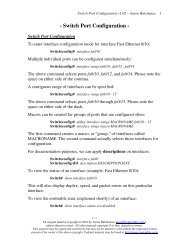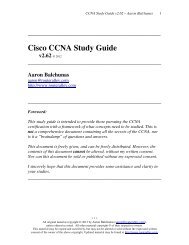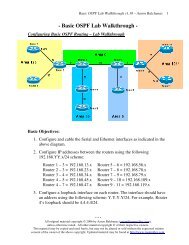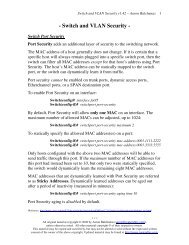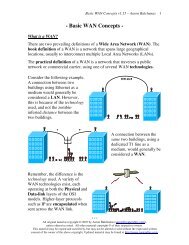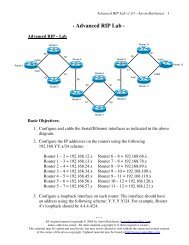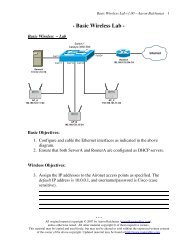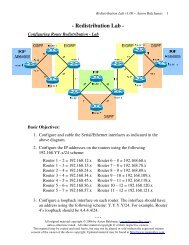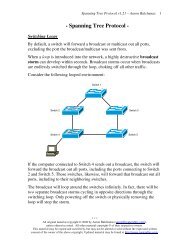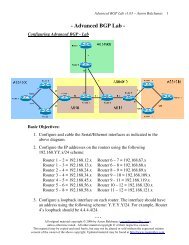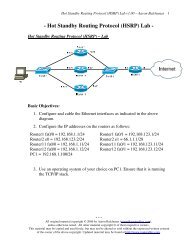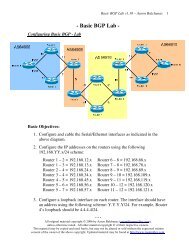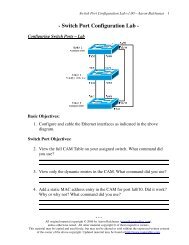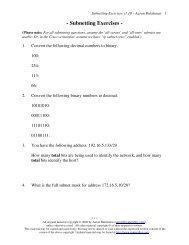Open Shortest Path First (OSPF) - Router Alley
Open Shortest Path First (OSPF) - Router Alley
Open Shortest Path First (OSPF) - Router Alley
Create successful ePaper yourself
Turn your PDF publications into a flip-book with our unique Google optimized e-Paper software.
<strong>OSPF</strong> v1.31 – Aaron Balchunas<br />
6<br />
<strong>OSPF</strong> Network Types<br />
<strong>OSPF</strong>’s functionality is different across several different network topology<br />
types. <strong>OSPF</strong>’s interaction with Frame Relay will be explained in another<br />
section<br />
Broadcast Multi-Access – indicates a topology where broadcast occurs.<br />
• Examples include Ethernet, Token Ring, and ATM.<br />
• <strong>OSPF</strong> will elect DRs and BDRs.<br />
• Traffic to DRs and BDRs is multicast to 224.0.0.6. Traffic from<br />
DRs and BDRs to other routers is multicast to 224.0.0.5.<br />
• Neighbors do not need to be manually specified.<br />
Point-to-Point – indicates a topology where two routers are directly<br />
connected.<br />
• An example would be a point-to-point T1.<br />
• <strong>OSPF</strong> will not elect DRs and BDRs.<br />
• All <strong>OSPF</strong> traffic is multicast to 224.0.0.5.<br />
• Neighbors do not need to be manually specified.<br />
Point-to-Multipoint – indicates a topology where one interface can connect<br />
to multiple destinations. Each connection between a source and destination<br />
is treated as a point-to-point link.<br />
• An example would be Point-to-Multipoint Frame Relay.<br />
• <strong>OSPF</strong> will not elect DRs and BDRs.<br />
• All <strong>OSPF</strong> traffic is multicast to 224.0.0.5.<br />
• Neighbors do not need to be manually specified.<br />
Non-broadcast Multi-access Network (NBMA) – indicates a topology<br />
where one interface can connect to multiple destinations; however,<br />
broadcasts cannot be sent across a NBMA network.<br />
• An example would be Frame Relay.<br />
• <strong>OSPF</strong> will elect DRs and BDRs.<br />
• <strong>OSPF</strong> neighbors must be manually defined, thus All <strong>OSPF</strong> traffic<br />
is unicast instead of multicast.<br />
Remember: on non-broadcast networks, neighbors must be manually<br />
specified, as multicast Hello’s are not allowed.<br />
* * *<br />
All original material copyright © 2007 by Aaron Balchunas (aaron@routeralley.com),<br />
unless otherwise noted. All other material copyright © of their respective owners.<br />
This material may be copied and used freely, but may not be altered or sold without the expressed written<br />
consent of the owner of the above copyright. Updated material may be found at http://www.routeralley.com.



